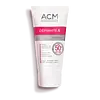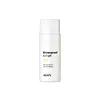What's inside
What's inside
 Key Ingredients
Key Ingredients

 Benefits
Benefits

 Concerns
Concerns

 Ingredients Side-by-side
Ingredients Side-by-side

Water
Skin ConditioningTitanium Dioxide
Cosmetic ColorantIsodecyl Neopentanoate
EmollientTriethylhexanoin
MaskingC12-15 Alkyl Benzoate
AntimicrobialGlycerin
HumectantCyclopentasiloxane
EmollientPolyglyceryl-4 Isostearate
EmulsifyingCetyl PEG/PPG-10/1 Dimethicone
EmulsifyingHexyl Laurate
EmollientAlumina
AbrasiveC30-45 Alkyl Methicone
EmollientC30-45 Olefin
Skin ConditioningCyclohexasiloxane
EmollientStearic Acid
CleansingCaprylic/Capric Triglyceride
MaskingCaprylyl Glycol
EmollientDisodium EDTA
CI 77492
Cosmetic ColorantOctyldodecanol
EmollientPentaerythrityl Tetra-Di-T-Butyl Hydroxyhydrocinnamate
AntioxidantSilica Dimethyl Silylate
EmollientSodium Chloride
MaskingSodium Myristoyl Glutamate
CleansingSorbic Acid
PreservativeTalc
AbrasiveCI 77891
Cosmetic ColorantTocopheryl Glucoside
EmollientTriethoxycaprylylsilane
Xanthan Gum
EmulsifyingWater, Titanium Dioxide, Isodecyl Neopentanoate, Triethylhexanoin, C12-15 Alkyl Benzoate, Glycerin, Cyclopentasiloxane, Polyglyceryl-4 Isostearate, Cetyl PEG/PPG-10/1 Dimethicone, Hexyl Laurate, Alumina, C30-45 Alkyl Methicone, C30-45 Olefin, Cyclohexasiloxane, Stearic Acid, Caprylic/Capric Triglyceride, Caprylyl Glycol, Disodium EDTA, CI 77492, Octyldodecanol, Pentaerythrityl Tetra-Di-T-Butyl Hydroxyhydrocinnamate, Silica Dimethyl Silylate, Sodium Chloride, Sodium Myristoyl Glutamate, Sorbic Acid, Talc, CI 77891, Tocopheryl Glucoside, Triethoxycaprylylsilane, Xanthan Gum
Water
Skin ConditioningEthylhexyl Methoxycinnamate
UV AbsorberHomosalate
Skin ConditioningEthylhexyl Salicylate
UV AbsorberDiethylamino Hydroxybenzoyl Hexyl Benzoate
UV FilterPropanediol
SolventDimethicone Crosspolymer
Emulsion StabilisingPentylene Glycol
Skin ConditioningSalvia Hispanica Seed Extract
EmollientCentella Asiatica Extract
CleansingHouttuynia Cordata Extract
Skin ConditioningAmmonium Acryloyldimethyltaurate/Vp Copolymer
Fructooligosaccharides
HumectantSaccharide Hydrolysate
HumectantAcrylates/C10-30 Alkyl Acrylate Crosspolymer
Emulsion StabilisingEthylhexylglycerin
Skin ConditioningTriethanolamine
BufferingPullulan
Octyldodecanol
Emollient1,2-Hexanediol
Skin ConditioningButylene Glycol
HumectantAnthemis Nobilis Flower Extract
MaskingEchium Plantagineum Seed Oil
Skin ConditioningHelianthus Annuus Seed Oil
EmollientPersea Gratissima Fruit Extract
EmollientCalendula Officinalis Flower Extract
MaskingCardiospermum Halicacabum Flower/Leaf/Vine Extract
Skin ConditioningDimethicone
EmollientXanthan Gum
EmulsifyingPolyglyceryl-3 Methylglucose Distearate
EmulsifyingPolysorbate 20
EmulsifyingPolyacrylate Crosspolymer-6
Emulsion StabilisingCI 77891
Cosmetic ColorantC12-15 Alkyl Benzoate
AntimicrobialTocopherol
AntioxidantGlyceryl Stearate
EmollientAloe Barbadensis Leaf Extract
EmollientPEG-100 Stearate
Aluminum Stearate
Cosmetic ColorantOleth-10
EmulsifyingPolyhydroxystearic Acid
EmulsifyingAlumina
AbrasiveIsodeceth-6
EmulsifyingT-Butyl Alcohol
PerfumingSimethicone
EmollientPhenoxyethanol
PreservativeParfum
MaskingWater, Ethylhexyl Methoxycinnamate, Homosalate, Ethylhexyl Salicylate, Diethylamino Hydroxybenzoyl Hexyl Benzoate, Propanediol, Dimethicone Crosspolymer, Pentylene Glycol, Salvia Hispanica Seed Extract, Centella Asiatica Extract, Houttuynia Cordata Extract, Ammonium Acryloyldimethyltaurate/Vp Copolymer, Fructooligosaccharides, Saccharide Hydrolysate, Acrylates/C10-30 Alkyl Acrylate Crosspolymer, Ethylhexylglycerin, Triethanolamine, Pullulan, Octyldodecanol, 1,2-Hexanediol, Butylene Glycol, Anthemis Nobilis Flower Extract, Echium Plantagineum Seed Oil, Helianthus Annuus Seed Oil, Persea Gratissima Fruit Extract, Calendula Officinalis Flower Extract, Cardiospermum Halicacabum Flower/Leaf/Vine Extract, Dimethicone, Xanthan Gum, Polyglyceryl-3 Methylglucose Distearate, Polysorbate 20, Polyacrylate Crosspolymer-6, CI 77891, C12-15 Alkyl Benzoate, Tocopherol, Glyceryl Stearate, Aloe Barbadensis Leaf Extract, PEG-100 Stearate, Aluminum Stearate, Oleth-10, Polyhydroxystearic Acid, Alumina, Isodeceth-6, T-Butyl Alcohol, Simethicone, Phenoxyethanol, Parfum
 Reviews
Reviews

Ingredients Explained
These ingredients are found in both products.
Ingredients higher up in an ingredient list are typically present in a larger amount.
Alumina is another name for the compound aluminum oxide. It is used as a thickener, absorbent, and abrasive.
As an absorbent, alumina can give a mattifying effect. It is used in mineral sunscreens to help coat nano-sized filters, such as titanium dioxide. By increasing the size of the UV filters, these ingredients stay on the skin for a longer time. By coating small sized ingredients, alumina helps thicken a product.
Alumina may be used as an abrasive, or exfoliant.
Alumina is naturally occurring in the mineral corundum. Certain varieties of corundum create rubies and sapphires. Corundum is also the crystalline form of alumina.
Learn more about AluminaC12-15 Alkyl Benzoate is made up of Benzoic Acid and long chain alcohols. It has a low molecular weight.
C12-15 Alkyl Benzoate is an emollient and texture enhancer. Due to its solubility, it is often used in sunscreens to help evenly distribute active ingredients.
As an emollient, C12-15 Alkyl Benzoate helps soften and hydrate your skin. Emollients create a film on your skin that traps moisture within.
This ingredient has been reported to cause eye irritation.
Learn more about C12-15 Alkyl BenzoateCi 77891 is a white pigment from Titanium dioxide. It is naturally found in minerals such as rutile and ilmenite.
It's main function is to add a white color to cosmetics. It can also be mixed with other colors to create different shades.
Ci 77891 is commonly found in sunscreens due to its ability to block UV rays.
Learn more about CI 77891Octyldodecanol is a fatty alcohol. It is primarily used to enhance the texture of products.
As an emulsifier, Octyldodecanol helps prevent the oils and waters from separating. It also prevents ingredients from creating foam when shaken.
Octyldodecanol is created by reducing fatty acid to an alcohol.
Due to its high molecular weight, it does not get absorbed into the skin.
Learn more about OctyldodecanolWater. It's the most common cosmetic ingredient of all. You'll usually see it at the top of ingredient lists, meaning that it makes up the largest part of the product.
So why is it so popular? Water most often acts as a solvent - this means that it helps dissolve other ingredients into the formulation.
You'll also recognize water as that liquid we all need to stay alive. If you see this, drink a glass of water. Stay hydrated!
Learn more about WaterXanthan gum is used as a stabilizer and thickener within cosmetic products. It helps give products a sticky, thick feeling - preventing them from being too runny.
On the technical side of things, xanthan gum is a polysaccharide - a combination consisting of multiple sugar molecules bonded together.
Xanthan gum is a pretty common and great ingredient. It is a natural, non-toxic, non-irritating ingredient that is also commonly used in food products.
Learn more about Xanthan Gum